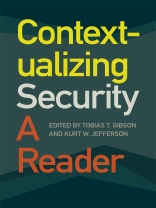Security studies, also known as international security studies, is an academic subfield within the wider discipline of international relations that examines organized violence, military conflict, and national security. Meant to serve as an introduction to the field of security studies, Contextualizing Security is a collection of original essays, primary source lectures, and previously published material in the overlapping fields of security studies, political science, sociology, journalism, and philosophy. It offers both graduate and undergraduate students a grasp on both foundational issues and more contemporary debates in security studies.
Nineteen chapters cover security studies in the context of homeland security and liberty, U.S. foreign policy, lessons from the Cold War, science and technology policy, drones, cybersecurity, the War on Terror, migration, study-abroad programs, the surveillance state, Africa, and China.
CONTRIBUTORS: Amelia Ayers, James E. Baker, Roy D. Blunt, Mark Boulton, Naji Bsisu, Robert E. Burnett, Daniel Egbe, Laila Farooq, Lisa Fein, Anna Holyan, Jeh C. Johnson, Richard Ledgett, David L. Mc Dermott, James Mc Rae, Amanda Murdie, Bernie Sanders, Jeremy Scahill, Kristan Stoddart, Jeremy Brooke Straughn, J. R. Swanegan, and Kali Wright-Smith
Über den Autor
KURT W. JEFFERSON is the dean of graduate education and a professor in the doctoral program in leadership at Spalding University. He is the author of Celtic Politics: Politics in Scotland, Ireland, and Wales and Christianity’s Impact on World Politics: Not by Might, nor by Power. His writing has also appeared in Vanguardia Dossier and the Christian Science Monitor. He lives in Louisville, Kentucky.












